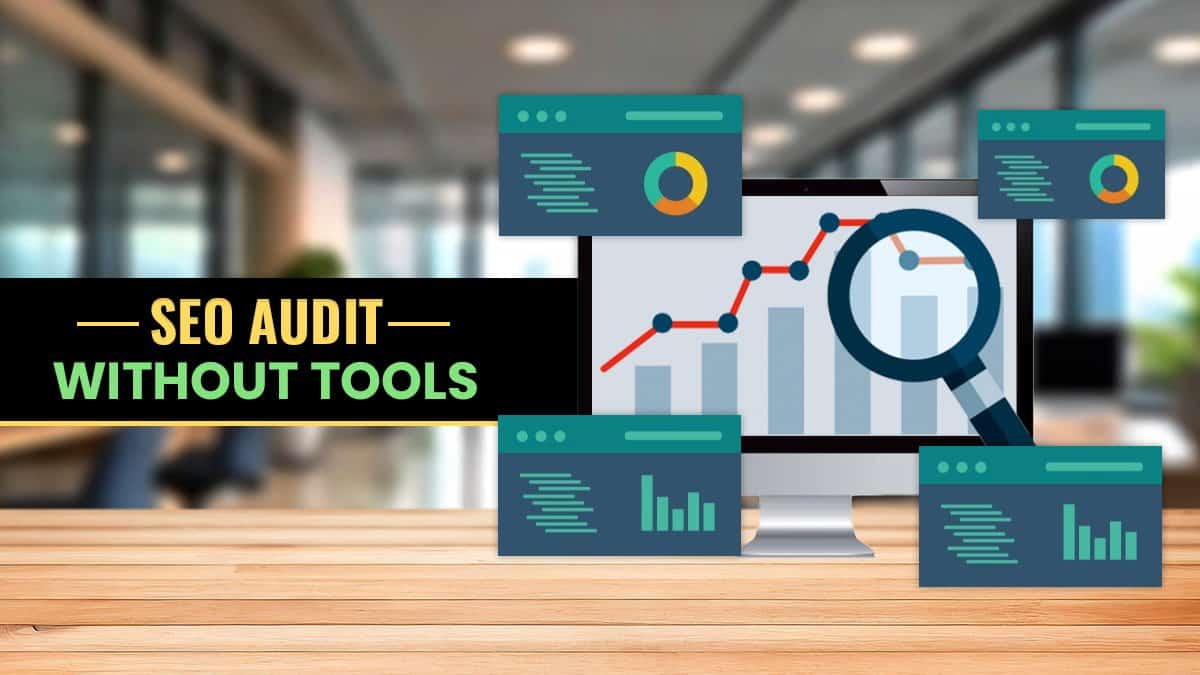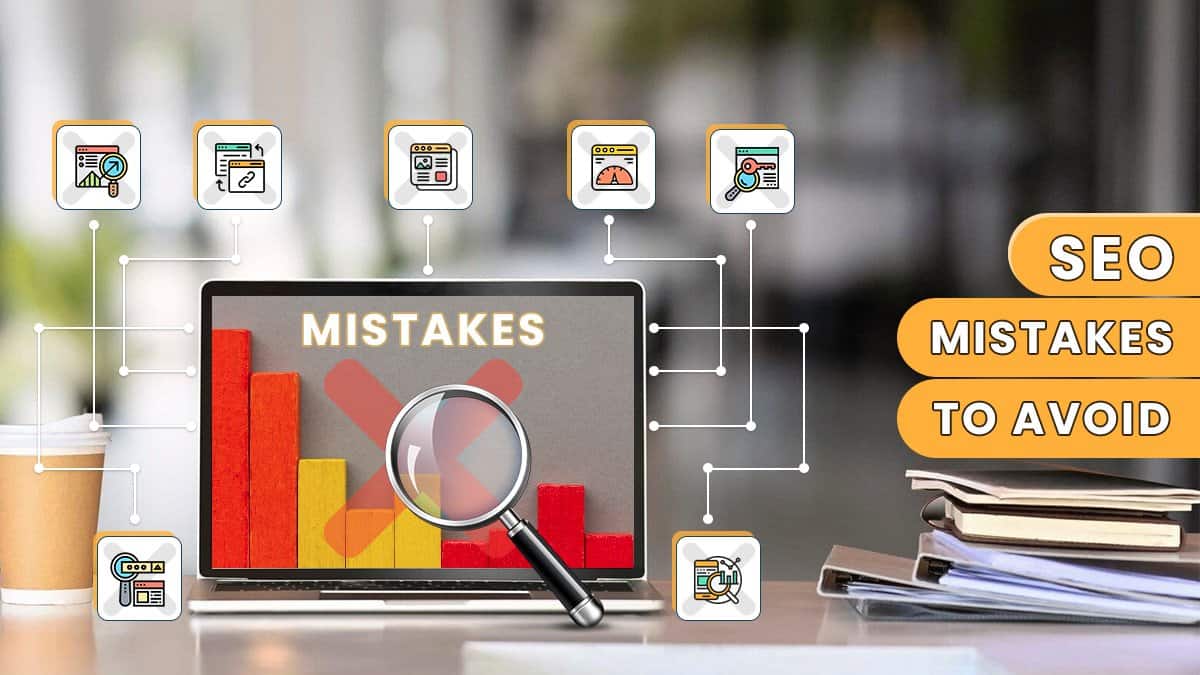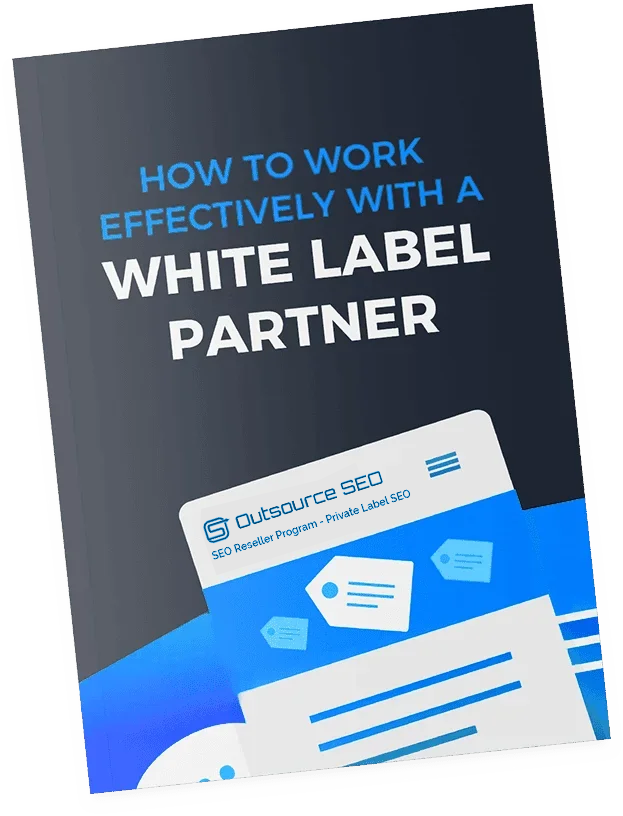Generating SEO reports can appear daunting to many. Most digital marketers would acknowledge that crafting reports consumes significant time and can be tedious. However, you can streamline this process by leveraging white label automation software, allowing you to generate SEO reports in mere seconds.
Moreover, these reports boost efficiency, engagement, comprehensiveness, and visual appeal. White label SEO reporting provides clients with in-depth SEO analyses, offering insights into website traffic and rankings. Renowned for facilitating decision-making processes, these reports extract data directly from the dashboard and present it in a user-friendly format, emphasizing metrics crucial for informed decisions.
Incorporating white label SEO reporting into your strategy can greatly enhance your prospecting endeavors and impress your clients. Are you keen on utilizing white label SEO reporting to elevate conversion rates, save time, and enhance productivity?
This post will delve into the benefits of white label SEO reporting and walk you through the setup process.
What Is A White-Label SEO Report?
White label SEO reporting, exemplified by tools like InstaReports, are standard reports distinguished by their lack of visible software branding. Unlike typical reports, these white-label versions are customized with the company’s logo and branding, ensuring a professional and personalized touch.
These reports offer exhaustive insights into the performance of white label SEO campaigns, encompassing data on keyword rankings, website audits, competitor analytics, and conversions. They represent invaluable tools for website owners and digital marketing agencies alike, facilitating informed decision-making and optimization endeavors to amplify organic traffic.
In the realm of digital marketing agencies managing multiple clients across diverse locations and overseeing both on-page and off-page campaigns, the necessity for organized reporting becomes paramount. Without a proper reporting system, locating specific progress data during client presentations can pose challenges. Implementing white label SEO reports streamlines this process, ensuring timely updates and seamless presentations tailored to each client’s branding.
From the client’s viewpoint, comprehensive reporting is pivotal to assessing the effectiveness of SEO campaigns and their impact on traffic and revenue. White label SEO reports furnish clients with insights customized to their business metrics, empowering them to monitor progress and measure success accurately.
Metrics To Include In A White Label SEO Report
The white label SEO report comprehensively includes all pertinent details regarding your website. It should encompass technical SEO, on-page SEO, and off-page SEO elements. Below are the essential points to incorporate into your white label SEO report.
On-page And Off-page SEO
Ensure your report starts with detailed data about your website. This data should include:
- The overall website score.
- Subscores for each subheading, like technical score, usability score, and others.
- An explanation of SEO results, explaining why all elements of your website should be optimized for search engines.
- Analysis of title tags and meta descriptions.
- Content analysis, offering suggestions regarding keyword density, headings and subheadings, alt tags, and other relevant factors.
- Off-page analysis, including details about internal and external links, strategies for enhancing Domain Authority (DA), and broken link fixes.
Technical SEO
The technical SEO report analysis provides insights into backend enhancements that can boost your website’s overall performance. It covers:
- Page speed analysis and optimization recommendations.
- Identification of any robot.txt files on your website.
- Analysis of Google Search Console (GSC) data.
- Examination of Google Analytics (GA) data.
- Evaluation of Google Tag Manager effectiveness.
- Detailed image optimization suggestions, including minifications and GZIP compression.
- Detection and removal of deprecated HTML codes.
- Analysis of inline style information.
Usability Analysis
The usability analysis in the SEO report offers insights into your website’s functionality, encompassing:
- Website responsiveness across different browsers and devices (mobile, tablet, and desktop).
- Thorough examination of various types of elements present on the website.
- Favicon analysis.
- Tap target size specifications.
Security Analysis
The security analysis of your website provides comprehensive information regarding its security levels and necessary or existing measures. This segment of the report facilitates understanding of vulnerabilities and enables improvement efforts. The report encompasses:
- SSL certificate details
- HTTPS and HTTP information (if applicable)
- Analysis of malware applications
Also Read: Mastering SEO Branding: Strategies to Increase Your Brand Awareness and Visibility
Types Of White Label SEO Reports
White-label SEO reports categorize data projections tailored to the extent required by businesses. In SEO, four essential reports are imperative for client visibility:
- Competitor Analysis Report
- Site Audit Report
- Keyword Report
- Conversion Report
Competitor Analysis Report
In any business field, competition is fierce, regardless of whether your business is broad or niche. For business or website owners, it’s imperative to monitor competitors’ activities to maintain a competitive edge closely. This serves two crucial purposes:
- Enables you to rank for relevant keywords and dominate your niche.
- Helps you avoid following the crowd and identifies untapped opportunities.
Though competitor analysis may not provide exhaustive insights, it does offer valuable direction on keyword prioritization and resource allocation. Transforming technical data into financial terms facilitates client communication, making white label SEO reporting indispensable for presenting business-centric information.
Site Audit Reports
Every operational website requires routine updates and maintenance. These updates vary for each site, addressing its unique strengths and weaknesses. Performing a thorough site audit is crucial to pinpoint these flaws and errors.
A comprehensive site audit covers various aspects, including SEO strength, site visibility, overall site health, and technical elements. These audits offer valuable insights into areas needing attention and metrics for improvement.
Given the detailed nature of the audit, the resulting report may be extensive. It’s essential to include relevant details from tools like Google Search Console, Google Analytics, and other SEO audit tools. Accuracy and specificity in these details inform the implementation of strategies on the website.
Making changes without data-driven and validated reports can harm the website. Hence, tracking these reports regularly-potentially monthly or quarterly-is imperative.
Keyword Reports
Keywords represent a fundamental SEO metric that marketers consistently monitor, influencing:
- Site authority
- Relevancy
- Ranking
Various SEO tools are utilized to track keywords. This tracking culminates in a comprehensive report that outlines the fluctuation of keywords within your business niche.
Typically, keyword reports document the ranking of keywords, allowing for proactive measures to be taken when keywords experience declines. These can be rectified through SEO optimization techniques. It’s advisable to track keywords across all aspects of your website, from blog posts to different pages. Implementing such tracking mechanisms yields substantial data, contingent upon the content volume on your site.
Keyword reports furnish an organized means of scrutinizing this data and identifying trends.
Conversion Reports
All businesses depend on conversion, which marks when a user chooses your marketed product or service. Conversion occurs through various methods and techniques, each measurable with trackable metrics that assess performance and signal the need for improvement.
Conversion reports focus primarily on click-through rates and lead generation, directly influencing ROI and serving as vital components of any business metric framework.
Within these parameters, a conversion report emerges as the essential document any client desires. It provides crucial data on progress, success rates, and return on investment.
These reports analyze different timeframes, SEO metrics, and comparative data, providing insights to guide future strategies effectively.
Why Are White Label SEO Reports Important?
Running an eCommerce business necessitates adept inventory, sales, and profit management. Yet, drawing in customers is pivotal to triumph. Grasping the reasons behind existing customers’ visits to your site is pivotal to garnering more. White-label reports streamline data, facilitating informed decision-making.
Through structured data, businesses can monitor and execute strategies to allure new customers and enrich the experience for current ones. Professional, methodical reporting is indispensable for business triumph.
The Benefits Of Using White Label SEO Reports
Maximize the potential of white-label SEO reports to advance your business to greater heights. Embrace branding and customization, refine client communication, ensure transparency, and enhance efficiency to revolutionize your SEO approach and bolster your agency’s reputation.
Brand Identity and Customization for White Label SEO Reports
Enhance your agency’s credibility and client engagement by incorporating branded and customized white-label SEO reports. Integrate your agency’s logo, colors, and design for a unified brand presentation. Tailor report templates with pertinent sections and metrics aligned with client objectives. Utilize interactive elements such as graphs to improve data visualization and offer personalized insights, fostering deeper client comprehension and trust.
Client Communication and Transparency via White Label SEO Reports
Effective communication and transparency are crucial aspects of white-label SEO reporting. Clear and comprehensive reports facilitate mutual understanding between agency and client, highlighting vital metrics like keyword rankings and traffic analysis. Customization with agency branding elevates professionalism, while regular updates keep clients abreast of progress and recommended actions, nurturing a collaborative partnership built on trust.
Time and Cost Efficiency through White Label SEO Reports
Through automation and streamlined workflows, White-label SEO reports provide significant time and cost savings. Automated reporting tools efficiently gather and format data, eliminating manual report creation and ensuring precision and uniformity. Experience up to a 40% reduction in reporting time, optimizing resource utilization and fortifying client relationships.
Additional Benefits of White Label SEO Reports
- Establishing Client Trust: Regular SEO reporting demonstrates genuine dedication and progress, fostering trust and mutual understanding between agency and client and addressing evolving requirements and business dynamics.
- Proactive SEO Campaign Management: Detailed reports enable the measurement and management of SEO campaigns, facilitating optimization based on Key Performance Indicators (KPIs) and identifying improvement areas over time.
- Delivering Value to Clients: Monthly reports underscore the tangible value delivered to clients’ businesses, reinforcing expertise and dedication and ultimately reducing churn rates through enhanced relationships and trust.
- Mitigating Major Issues: Monthly reports serve as a comprehensive record of SEO campaigns, enabling early detection and resolution of minor issues before they escalate, ensuring seamless campaign operations and client satisfaction.
How To Create A White-Label SEO Report?
In this segment, we will thoroughly cover the essential steps for creating a white-label SEO report. This involves selecting the appropriate white-label SEO reporting tool and adapting the report template for a polished outcome.
Furthermore, we will emphasize the significance of integrating pertinent data and metrics to enhance the caliber of your white-label SEO report. Be prepared to present your clients with detailed, customized reports that showcase your expertise.
Selecting A White-Label SEO Report Tool
Selecting the right white-label SEO reporting tool is crucial for effective client communication and efficient reporting procedures. Several key considerations come into play when making this decision.
Firstly, prioritize tools that provide comprehensive reporting capabilities. Look for features such as customizable templates, seamless data integration, and the ability to track essential metrics. These features ensure you have the necessary resources to analyze and report on your clients’ SEO performance thoroughly.
Additionally, evaluate the usability and interface of potential tools. Choose solutions with user-friendly interfaces that make navigation and report customization straightforward. This saves time and effort during the reporting process.
Integration capabilities are also essential. Ensure the tool integrates seamlessly with other platforms and consolidates data from various sources. This enables comprehensive reporting from a single interface.
Moreover, consider options for brand customization. Look for tools that allow you to incorporate your agency’s branding into reports, projecting a professional image and reinforcing your brand identity.
Lastly, prioritize tools that support client access and collaboration. Select platforms that enable report sharing with clients and facilitate collaborative data analysis and strategy development. This enhances communication and decision-making.
By carefully evaluating these factors, you can find the most suitable white-label SEO reporting tool for your agency’s needs. However, remember to align your decision with your budget and specific reporting requirements before making a final choice.
Creating Custom Report Templates For Private Label SEO Reports
To customize a report template for white-label SEO reports, follow these steps:
- Select a white-label SEO reporting tool with customizable templates.
- Adjust the template to match your agency’s branding by incorporating colors, logos, and fonts.
- Populate the template with pertinent data and metrics tailored to your clients’ SEO campaigns, such as keyword rankings, organic traffic analysis, and website performance metrics.
- Integrate a backlink profile analysis to showcase the quality and quantity of backlinks directed to your client’s websites.
- Include a competitor analysis section to demonstrate your clients’ performance compared to their competitors.
- Provide recommendations and an action plan to guide your clients towards enhancing their SEO strategies.
By customizing the report template for white-label SEO reports, you can deliver professional and branded reports that precisely address your client’s requirements, bolstering your agency’s credibility and fostering stronger client relationships.
Enhancing White Label SEO Reports With Key Data And Metrics
Including pertinent data and metrics in white-label SEO, reports is crucial for delivering valuable insights to clients and gauging the effectiveness of SEO strategies. An adequately organized table is key for presenting this information efficiently.
The table must include several columns, including “Metric Name,” “Current Value,” “Previous Value,” and “Change.” Relevant data points such as organic traffic, keyword rankings, website performance, backlink profile, and competitor analysis must be incorporated.
By integrating these metrics, agencies can convincingly showcase the outcomes of their SEO endeavors and provide actionable suggestions for improving online visibility.
Essential Elements For A White Label SEO Report
Understanding the essential components of a white-label SEO report is imperative. This section will delineate the crucial elements contributing to a proficient report, comprising an executive summary summarizing findings, website performance metrics assessing SEO success, and comprehensive analyses of organic traffic and backlink profiles.
Executive Summary
The Executive Summary within a White Label SEO Report serves as a concise overview, presenting crucial information and outcomes from the report. It offers clients a rapid glimpse into the campaign’s performance and emphasizes significant insights.
This summary commonly encompasses website performance, keyword rankings, organic traffic analysis, and competitor assessment.
This summary, positioned at the report’s outset, facilitates clients’ comprehension of overall progress and aids them in making well-informed decisions.
Website Performance Metrics
Website performance metrics such as page load time, bounce rate, conversion rate, organic traffic, and mobile optimization constitute fundamental elements of a White Label SEO Report.
These metrics furnish valuable insights into the effectiveness of an SEO campaign. By meticulously monitoring and analyzing them, agencies can accurately assess website performance and devise informed optimization strategies.
Page load time measures the speed at which a webpage fully loads, a crucial determinant of user experience and bounce rates. Bounce rate signifies the percentage of visitors who leave the website without interacting with other pages, indicating potential areas for content improvement, enhancing user experience, or refining navigation.
Conversion rate denotes the percentage of visitors who complete desired actions, like making purchases or submitting forms, directly assessing the website’s ability to convert visitors into customers or leads.
Organic traffic quantifies the number of visitors arriving from search engine results pages, serving as a direct gauge of the SEO campaign’s effectiveness in driving traffic. Mobile optimization evaluates the website’s performance on mobile devices, encompassing factors such as page speed and responsiveness, which is particularly significant considering the surge in mobile browsing.
Incorporating these metrics into a white-label SEO Report enables agencies to showcase the effectiveness of their SEO strategies and equip clients with actionable insights to improve website performance.
By furnishing clients with comprehensive data on website performance, agencies empower them to make informed decisions and attain superior outcomes.
Keyword Rankings
Keyword rankings play a pivotal role in a white-label SEO report, serving as a yardstick to evaluate the efficacy of a website’s SEO initiatives. They furnish invaluable insights into how specific keywords perform over time, offering a litmus test for the success or shortcomings of SEO strategies.
Keeping tabs on keyword rankings enables the pinpointing of opportunities to refine SEO efforts and attain superior rankings. By juxtaposing rankings against competitors, a comprehensive competitor analysis unfolds, shedding light on their tactics and areas for enhancing one’s own campaigns.
Furthermore, keyword rankings function as a tangible gauge of the impact of SEO investments and facilitate transparent reporting of ROI to clients, highlighting the significance of their SEO undertakings.
Organic Traffic Analysis
Analyzing organic traffic is a crucial component of a White Label SEO Report, offering valuable insights into the effectiveness of organic search strategies. It enables the assessment of website performance and the identification of areas with potential for improvement. The Organic Traffic Analysis typically includes the following:
- Date Range: Specifies the period under examination.
- Total Organic Traffic: Indicates the overall number of visitors from organic search sources.
- Organic Traffic Growth: This shows the percentage change in organic traffic compared to the previous period.
- Top Organic Landing Pages: Lists the pages attracting the highest organic traffic.
- Keyword Performance: Offers insights into the performance of targeted keywords, including rankings and fluctuations.
- Click-through Rate (CTR): Represents the percentage of users who clicked on the website’s link in search results.
- Bounce Rate: Indicates the percentage of visitors who leave the site after viewing only one page.
Incorporating Organic Traffic Analysis into a White Label SEO Report helps assess the effectiveness of SEO efforts and guides future optimization strategies.
Backlink Profile
In a white-label SEO report, a comprehensive backlink profile provides crucial insights into the quantity and quality of backlinks pointing to a website. This profile aids clients in understanding their website’s authority and visibility across search engines. When constructing a backlink profile, it’s vital to include the following key components:
- Total count of backlinks and trends in growth over time.
- Analysis of backlink distribution by source, including guest posts, directories, and social media platforms.
- Evaluation of anchor text to gauge keyword relevance.
- Assessment of link quality, considering factors like spam score and domain authority.
- Identification of toxic or low-quality backlinks that may negatively impact SEO efforts.
- Comparison of competitors’ backlink profiles to uncover opportunities for enhancement.
Incorporating a backlink profile into a white-label SEO report empowers agencies to effectively communicate the value of their SEO endeavors and devise strategies for bolstering their clients’ online presence.
Competitor Analysis
A comprehensive SEO report must consistently incorporate a competitor analysis. This analysis is essential for both agencies and their clients to enhance their comprehension of their market standing and pinpoint areas for improvement.
A table format can effectively present the competitor analysis. Below is an example:
| Competitor | Organic Traffic | Backlink Profile | Keyword Ranking |
| Competitor A | 10,000 monthly visitors | High-quality backlinks from authoritative sites | Ranks higher for target keywords |
| Competitor B | 5,000 monthly visitors | Moderate backlink profile | Mixed keyword rankings |
| Competitor C | 2,000 monthly visitors | Limited backlinks | Poor keyword rankings |
By thoroughly analyzing these metrics, agencies can devise effective strategies to outperform competitors and maximize their clients’ SEO efforts.
Agencies can bolster the competitiveness of their clients’ websites by prioritizing the development of a robust backlink profile, enhancing keyword rankings, and boosting organic traffic. They can achieve this by offering guidance on targeting specific keywords and optimizing content to attract a wider audience.
Incorporating a detailed competitor analysis into white-label SEO reports enables agencies to furnish valuable insights to clients and demonstrate their expertise in the field. This transparent and strategic approach not only fosters enduring partnerships but also guarantees the provision of impactful SEO solutions.
Recommendations And Action Plan
When creating a white-label SEO report, it’s crucial to include recommendations and an action plan to guide clients in improving their website’s visibility and performance.
This section provides specific steps based on the analysis conducted. Recommendations could include optimizing meta tags, improving website speed, or creating high-quality content. Additionally, an action plan outlines detailed tasks and their corresponding timelines.
Agencies can help clients progress towards their SEO goals by providing precise and practical recommendations. Research shows that implementing suggestions from an SEO audit can result in a significant 61% increase in organic search traffic.
Automated vs Manual Reports
There are two primary types of SEO reports:
- Automated reports: These are generated by third-party tools.
- Manual reports: These are curated manually, incorporating personal touches.
Automated reports provide visually appealing, data-driven statistics through third-party SEO report-generating tools. On the other hand, manual reports require more time and effort to create tables, checkboxes, and other elements.
In the pre-automation era, manual SEO reports were prevalent, each with advantages and disadvantages.
Benefits Of Manual SEO Reports
Before the advent of automation tools, Excel was the dominant data presentation software. Even today, Excel remains the most commonly utilized tool for presenting data, including complex datasets. Manual reports generated through tools like Excel offer certain benefits:
- Familiarity: They are created using familiar tools, minimizing the need to learn new software.
- Customization: Manual SEO reports can be customized extensively, allowing various columns or rows to be added.
- Data Flexibility: Manual reports have no limitations on data insertion, as there are no constraints on integrating plugins or third-party applications.
However, alongside these benefits, manual SEO reports also entail certain drawbacks:
- Time Consumption: The process of copying and pasting data manually can be time-intensive and prone to errors.
- Formula Dependency: Proficiency in Excel formulas is necessary to produce comprehensive manual SEO reports, which may not always meet client expectations.
- Time Investment: Manually incorporating data is laborious, demanding significant time and effort.
Benefits Of Automated SEO Reports
Automated SEO reporting systems offer advantages that streamline processes for digital marketing strategists and agency owners:
- Time and Resource Optimization: Ready-to-go reports save time, money, and productive hours, enabling professionals to focus on critical tasks like planning campaigns, content creation, and supervision.
- Delegation of Monotonous Tasks: Automation allows for delegating repetitive tasks to software, freeing agency owners to concentrate on more strategic endeavors.
- Efficiency and Cost Savings: Automating report generation and distribution saves significant time and financial resources, enabling professionals to allocate efforts towards tasks contributing directly to business growth.
- Insightful Business Analysis: Automated reporting provides insights into a business’s performance, enabling timely adjustments to strategies and preventing loss in traffic and revenue. It facilitates team collaboration by keeping members informed and fostering involvement in business growth.
- Enhanced Data Presentation: Automated reports offer visually appealing presentations of data, enhancing readability and comprehension for stakeholders.
- Customization and Flexibility: While automation provides efficiency, manual reporting offers greater customization flexibility. However, automated systems offer features for data comparison over time and branding efforts integration.
- Accessibility and Connectivity: Automated reports ensure accessibility across devices, promoting overall efficiency. Nonetheless, reliance on internet connectivity may pose challenges, and some tools may require payment, unlike manual reporting options.
While automated reporting offers benefits, it’s essential to acknowledge potential drawbacks. Dependence on internet connectivity and reliance on specific tools may pose challenges. Additionally, some automated reporting solutions may incur costs, unlike manual alternatives like Excel or PowerPoint.
However, the efficiency, accuracy, and scalability of automated systems often outweigh these concerns, making them a preferred choice for modern agencies striving for excellence in digital marketing performance and client satisfaction.
How To Select An Automated SEO Reporting Tool?
Selecting an automated SEO reporting tool is a crucial decision in a competitive market landscape. Here are some key considerations:
- Evaluate Beyond Marketing Hype: Focus on functionality rather than flashy marketing. Assess how the tool meets your needs and improves your business, including client retention.
- Prioritize Ease of Setup: Opt for an easy tool to set up to avoid unnecessary complications.
- Emphasize Prospecting Support: Look for a tool that aids in prospecting. For instance, InstaReports generates impressive reports to facilitate client engagement and appointment setting.
- Support Sales Process Structure: Choose a tool that helps structure your sales process. Ensure it guides you through each step, from initial contact to closing, optimizing communication with prospects.
- Demand Real-Time Data: Ensure the tool provides up-to-date analytics for effective strategic decisions. Timely data is crucial for accurate insights and informed actions.
- Seek Customization Options: Select a tool that allows customization tailored to clients’ needs. InstaReports, for example, can customize metrics and report frequency according to client preferences.
- Require Keyword Segmentation: Opt for a tool that enables keyword segmentation for organized reporting. This feature simplifies tracking and analysis of diverse keyword sets while maintaining report clarity.
- Insist on On-Page SEO Insights: Prioritize tools offering detailed insights into on-page or technical SEO aspects. A comprehensive understanding of on-page SEO is essential for optimizing website performance.
- Demand Progress Tracking: Ensure the tool provides comprehensive progress reports, including changes in rankings, keyword performance, and website traffic. These reports should offer insights into milestones and achievements.
In summary, prioritize functionality, ease of use, prospecting support, sales process optimization, real-time data, customization, keyword segmentation, on-page SEO insights, and progress tracking when selecting an SEO reporting tool. Choose a tool that aligns with your agency’s needs, providing insightful reports for informed decision-making.
Creating SEO Reports For Clients Using InstaReports
- Utilize Contact Information:
- Access the InstaReports app through your DashClicks white-label dashboard.
- Navigate to Templates after clicking on InstaReports.
- InstaReports utilizes contact information stored in your Contacts app to generate SEO reports.
- Analyze Website Performance:
- Input necessary details into InstaReports.
- The tool automatically analyzes website performance, identifying errors and suggesting optimizations.
- Access InstaReports App:
- Find the app drawer in the top right corner of the DashClicks white-label dashboard.
- Click on InstaReports and proceed to Templates.
- Explore Available Templates:
- DashClicks’ InstaReports Template offers various templates.
- Currently, only “Digital Overview” is accessible.
- Understand “Digital Overview”:
- This template provides a comprehensive overview of the client’s online presence.
- It encompasses social media presence, directory listings, business reviews, Google and Facebook ads, and website health SEO.
- Each metric receives a specific score.
- Preview and Build Reports:
- Click on “Preview” to view a demo report.
- Once satisfied, proceed to “Build” to generate the report.
- Access Generated Reports:
- Navigate to the second tab, “My InstaReports,” within the InstaReports app.
- This tab displays the table of InstaReports generated by your team.
- If no reports are pending, the table will be empty.
Top Automated SEO Reporting Tools
Numerous automated SEO reporting tools are continually emerging. However, selecting the optimal tool is crucial for generating the most effective SEO report. Below, we present our top choice of automated white label SEO reporting tools:
SEMrush provides a comprehensive SEO reporting tool with a range of features:
- Create SEO reports from scratch or use pre-existing templates.
- Integrate data from external applications like Google Analytics (GA), Google Search Console (GSC), and others to craft visually appealing reports.
- Select from a variety of custom theme options to match your brand.
- Automate report generation through a scheduling system.
- Additionally, SEMrush offers extensive SEO campaign support through its toolkit, which is available in different packages:
- Pro package: $119.95/month
- Guru package: $229.95/month
- Business package: $449.95/month
SE Ranking offers thorough SEO reporting and analysis, delivering detailed insights into your website’s performance. It is a comprehensive SEO reporting tool suitable for businesses of all sizes. With SE Ranking, you can produce visually engaging data presentations sourced from multiple channels.
Moreover, the tool provides customization options, including selecting time frames, utilizing drag-and-drop functionality, and integrating branding elements and logos.
Like SEMrush, SE Ranking provides the convenience of auto-generated reports and scheduled email deliveries to clients. It offers three pricing tiers:
- Essential package: $39/month
- Pro package: $89/month
- Business package: $189/month.
What Are White Label SEO Report Generators?
A white label SEO report generator compiles data from platforms like Google Analytics, SEMrush, and Search Console to comprehensively view a website’s optimization. Beyond displaying metrics, it offers contextual insights and tailored recommendations. These include identifying underperforming landing pages or technical vulnerabilities and guiding digital marketers on strategy.
The generator provides assessments of current SEO efficacy and a roadmap for future visibility gains. It’s essential for businesses aiming to measure, track, and refine their website’s organic growth channels over time. Its insight granularity and integration capabilities democratizes access to optimization best practices for firms of all experience levels.
Also Read: How Long does SEO Take to Show Results and Factors Influencing It
The Growth Of Tools Generating SEO Reports
In the earlier days of the internet, websites were rather basic, and the concept of search engine optimization (SEO) was just starting to take shape. Over time, however, digital marketing has grown considerably more intricate, prompting the development of tools and methodologies to navigate this evolving landscape.
Initially, SEO professionals had to manually gather data from various sources, including search engines, analytics platforms, and keyword tools. This process was time-consuming and prone to errors, resulting in fragmented reports.
Acknowledging this challenge, innovators began devising tools to streamline the reporting process. Early SEO report generators primarily focused on fundamental metrics such as keyword rankings but gradually expanded to offer more comprehensive insights.
Today’s SEO report generators leverage artificial intelligence and sophisticated algorithms to present and interpret data. They not only furnish actionable recommendations but also bridge the gap between data collection and strategic implementation.
As digital agencies gained prominence, a demand for branded reports emerged. White label SEO report generators emerged to fulfill this requirement, enabling agencies to deliver detailed reports under their branding.
In the era of data-driven decision-making, SEO report generators have become indispensable. They serve to centralize SEO data, saving time, minimizing errors, and ensuring consistency. These tools empower businesses and agencies to refine strategies and achieve superior outcomes by offering a clear overview of a website’s SEO performance.
In essence, SEO report generators:
- Consolidate historical website optimization data from leading platforms.
- Centralize key metrics spanning keywords, site traffic, and backlinks.
- Augment numerical data with insights and recommendations.
- Identify areas necessitating refinement and propose actionable strategies.
- Provide assessments of current SEO effectiveness and future visibility.
- Prove invaluable for businesses aiming to monitor and enhance organic growth channels.
Advantages Of Using A White Label Report Generator
Transitioning to white label SEO reporting offers substantial advantages for digital agencies aiming to bolster branding and foster client trust. Tailored integrations feature the agency’s logo and color palette, reinforcing expertise while eliminating external tool branding.
Client retention improves when clients perceive enhanced value from personalized recommendations and aligned metrics. Additionally, extended capabilities increase efficiency with scalable templates for client reporting.
Key Advantages
| Advantages | Description |
| Strengthens Agency Brand Identity | Displaying agency colors and logos prominently enhances its standing. |
| Enhances Transparency in Reporting | Providing direct analytics access fosters informed decision-making. |
| Stimulates Client Growth and Loyalty | Tailored recommendations foster perceived value from the agency. |
| Improves Reporting Efficiency at Scale | Utilizing templates and automation streamlines multi-client reporting. |
| Enables Focus on Strategic Analysis | Outsourcing reporting infrastructure frees up time for metric consultations. |
| Elevates Agency Position in the Market | Establishing unique market positioning through branded analytics expertise. |
White label SEO reporting simplifies reporting processes for agencies, boosting productivity, client expansion, and retention. Through outsourcing reporting infrastructure, agencies can prioritize analysis and consulting services. Embracing white label SEO reports provides substantial benefits for firms, elevating their market positioning.
9 Easy-to-Use Tools for Generating White Label SEO Reports
Understanding SEO reporting can feel overwhelming, yet having practical tools is crucial. Below is a list of industry leading white label SEO report generators.
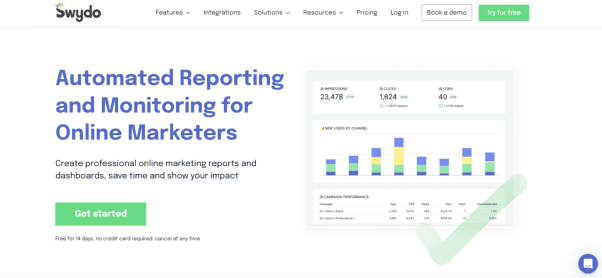
Swydo offers a comprehensive platform designed specifically for online marketers. It facilitates the efficient creation of professional reports and dashboards, which is particularly valuable for marketing agencies and professionals overseeing online advertising campaigns. Swydo allows users to save time and showcase the impact of their efforts through insightful reports.
Primarily targeting marketing agencies, online marketers, and professionals managing online advertising campaigns, Swydo is an ideal solution for creating, managing, and sharing reports on marketing performance. It aims to streamline the reporting process and save time.
Key Features:
- Customizable reports
- Data integration with platforms like Google Analytics and Facebook Ads
- Automation options for scheduling and emailing reports
- Advanced analytics tools for in-depth data analysis
- Collaboration functionalities for secure sharing with team members and clients
| Pros | Cons |
| Tailored reports offer clarity and relevance. | Some users may find data sources limited, hindering comprehensive analytics. |
| Seamlessly integrates with diverse data sources. | Customization options might not satisfy all users, presenting challenges for specific report needs. |
| Time-saving automation ensures current reporting. | Customer support could be restricted, particularly for lower-tier users. |
| Advanced analytics tools provide in-depth strategic insights. | – |
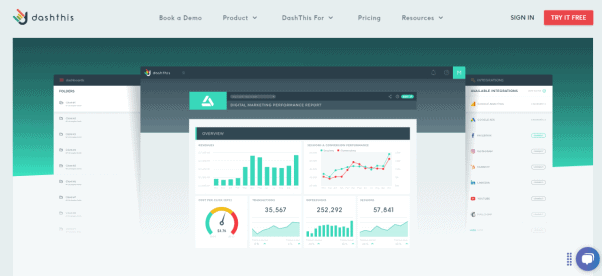
DashThis is a marketing reporting tool that automates the creation of SEO and digital marketing reports. It integrates with various SEO and digital marketing tools, allowing users to access all their marketing data in one dashboard. Users can also upload custom data through CSV files. DashThis aims to streamline report creation and save time by providing preset templates or allowing users to build reports from scratch without coding.
Ideal for marketing agencies and digital marketers, DashThis consolidates data from multiple channels into a single, user-friendly dashboard. Its focus is on time savings in data collection and report creation, with an emphasis on visually appealing and intuitive design.
Key Features:
- Integrations with major SEO tools, PPC platforms, web analytics, social media, and custom data via CSV
- Customization options, including custom domain use, theme customization, and white labeling for reports
- Preset report templates and cloning options for efficient report creation
- Easy sharing via email, URL, or PDF for flexible and real-time access
| Pros | Cons |
| Extensive array of integrations facilitating thorough data compilation | Tailored customization requests might necessitate assistance |
| Intuitive interface and effortless customization options for reports | Price consideration for smaller agencies or freelancers might arise |
| Templates and cloning functionalities for quick report generation, saving time | Advanced users may find manual data manipulation options restricted |
| Exceptional customer support, lauded by users | – |
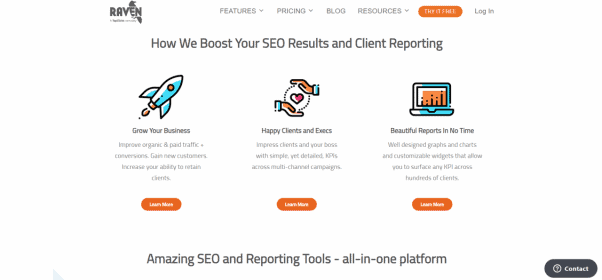
Raven Tools offers a comprehensive SEO and marketing reporting platform to improve organic and paid traffic, conversions, and customer retention. Its suite of tools provides clear KPIs across multi-channel campaigns, including website audits, backlink analysis, rank tracking, competitor research, and more. The platform emphasizes efficient and visually appealing reporting, offering customizable widgets and well-designed graphs and charts.
It serves digital marketing agencies, freelancers, in-house marketers, and media companies looking for a robust solution to effectively manage and report on their SEO and digital marketing efforts. Raven Tools is particularly suitable for those who appreciate the ability to impress clients with insightful and visually appealing reports.
Key features:
- WYSIWYG Reports: Generates customizable and brandable reports, presenting data in various sections.
- Dynamic Updates with Google Sheets: Facilitates automatic updating of reports via Google Sheets, ensuring the latest data is always reflected.
- Comprehensive SEO and Marketing Tools: Integrates tools for website audits, backlink analysis, rank tracking, and more into the reporting process.
| Pros | Cons |
| Simple installation process and the option to schedule reports | Certain functions might be challenging to navigate |
| Seamlessly integrates with numerous platforms, ideal for overseeing multiple campaigns | Customizing reports is somewhat restricted |
| Reasonable pricing with a trial version accessible | Features might not match the potency of some direct rivals such as Semrush |
| Unlimited reports and adjustable widgets for comprehensive insights | Insufficient tutorials on effectively utilizing all platform functionalities |
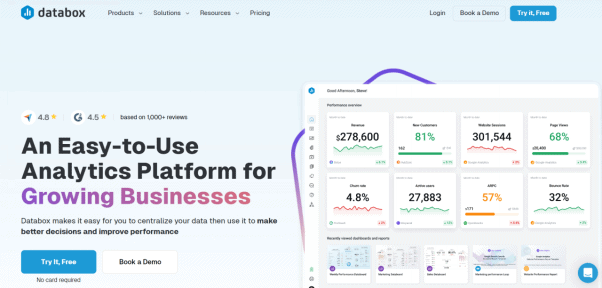
Databox serves as a reporting tool that gathers data from various SEO and marketing tools, consolidating it into a centralized dashboard. This enables users to generate professional reports and data visualizations effortlessly, without the need for graphic design expertise. The tool streamlines the reporting process through automation, allowing for scheduled reports and reminders.
It caters to digital marketing agencies, in-house marketing teams, and professionals seeking to streamline their reporting process. This is especially beneficial for consolidating data from multiple sources into visually appealing reports for analysis or client presentations.
Key features:
- Over 100 native integrations for aggregating data from critical SEO tools.
- Sleek and customizable report creation without requiring external design assistance.
- Automated reporting workflow, including scheduled report sends and reminders.
- Drill-down capabilities offer detailed insights into content and optimization initiatives. This includes focusing on specific keywords, impressions, clicks, and grouped page performance.
| Pros | Cons |
| Compatible with diverse SEO and marketing tools for thorough data collection. | Mastery of specific customizations might necessitate some learning to leverage fully. |
| Time-saving automated report generation ensures prompt delivery of insights. | Advanced features and extensive customization options may be associated with a higher cost, potentially affecting smaller teams or businesses. |
| Intuitive interface streamlines the creation and distribution of polished reports. | – |
| Tailorable dashboards facilitate intricate, client-tailored reporting, elevating client satisfaction. | – |
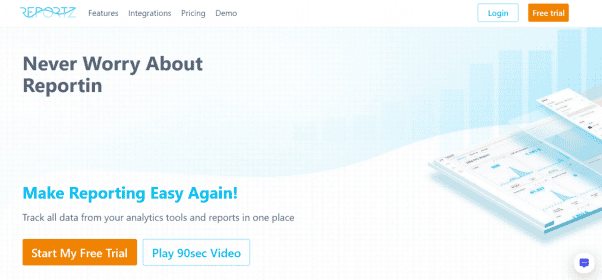
Reportz is a white label reporting tool that emphasizes automation and real-time data access from multiple sources. Its purpose is to streamline report generation and data analysis, allowing marketers to focus on strategic decision-making. The platform enables the creation of custom digital marketing KPI dashboards in under 3 minutes.
This tool is tailored for marketing agencies, online marketers, and professionals managing online advertising campaigns. It’s particularly useful for showcasing campaign impact on metrics like website traffic, conversions, and client revenue.
Key features:
- Customizable reports
- Integration with various marketing platforms
- Automation for scheduling and emailing reports
- Advanced analytics for deeper insights
- Secure collaboration options for team members and clients
| Pros | Cons |
| Streamlines reporting by merging data from different analytics tools. | New users might face a learning curve. |
| Tailored reports can be customized to meet specific requirements. | Requests for custom data integration need support assistance. |
| Time-saving automation features for report generation. | – |
| Promotes teamwork through effortless sharing of reports and dashboards. | – |
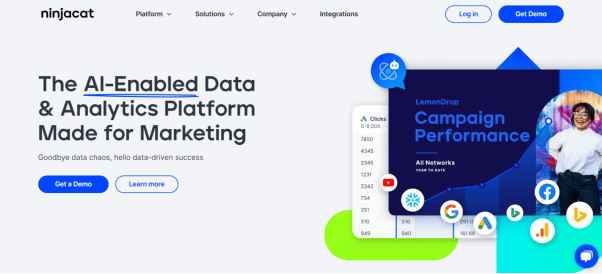
NinjaCat is a robust marketing performance management platform crafted to streamline reporting, monitoring, call tracking, and data pipeline solutions for digital marketing agencies and marketing companies. Its goal is to enhance marketing analytics through intuitive, personalized, and effective approaches, utilizing AI and big data for insights and task automation.
The platform suits digital marketing agencies, multi-location brands, and media companies seeking a unified solution to oversee and report on their marketing performance across various channels and campaigns. Its comprehensive features aim to save time on report generation while providing profound insights into marketing analytics.
Key features:
- Customizable Reporting: Tailors reports to meet client preferences, enhancing marketing strategy presentation.
- Data Integration: Simplifies data aggregation from 100+ platforms for cohesive reports.
- AI-Enabled Analytics: Automates tasks and democratizes data access, improving accessibility and actionability.
- Multi-Location Reporting: Supports roll-up reporting for businesses with multiple locations or diverse marketing channels.
| Pros | Cons |
| Offers extensive integration capabilities, simplifying data gathering from diverse sources. | New users might face a learning curve to effectively utilize all available functionalities. |
| Tailorable reports enhance client presentations and boost reporting efficiency. | Advanced customization and AI-driven analytics could entail a higher cost, potentially impacting smaller firms. |
| AI-powered insights and automation streamline mundane tasks and enhance data analysis. | Users with specific needs may require more detailed data manipulation. |
| Facilitates aggregated reporting for marketing strategies across multiple locations or channels. | – |
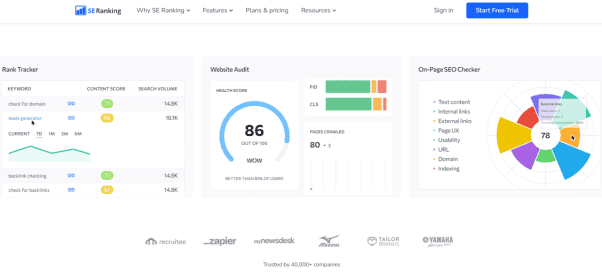
SE Ranking serves as an adaptable SEO platform crafted for a thorough analysis of websites. It offers a range of tools for monitoring, researching, and optimizing SEO endeavors, encompassing keyword rank tracking, website audits, competitor analysis, backlink checking, and more, presenting a comprehensive SEO strategy.
SE Ranking caters to a broad audience, including SEO professionals, digital marketing agencies, SMBs, and large enterprises. Its extensive toolset and flexible pricing render it suitable for those seeking detailed SEO insights and reports to inform decision-making and strategy refinement.
Key features:
- Rank Tracker: Daily monitoring of keyword rankings across search engines and locations.
- Website Audit: Identifies and recommends enhancements for SEO issues.
- Backlink Checker and Monitor: Analyzes and tracks backlink profiles.
- Competitor Research: Provides insights into competitors’ organic and paid search strategies.
- On-Page SEO Checker: Evaluates webpage optimization for targeted keywords.
- Report Builder: Creates customizable and automated SEO reports for regular delivery.
| Pros | Cons |
| Offers a wide range of tools covering all key aspects of SEO | Might pose a challenge for newcomers due to the extensive range of features |
| Provides highly adaptable and intricate reports for profound insights | Certain functions may necessitate a learning curve for optimal utilization |
| Features competitive pricing with flexible plans for varying business scales | Advanced analysis may require integration with external tools for comprehensive data |
| Boasts an intuitive interface designed for efficiency and user-friendliness | While offering extensive customization options, it may demand an initial setup time |
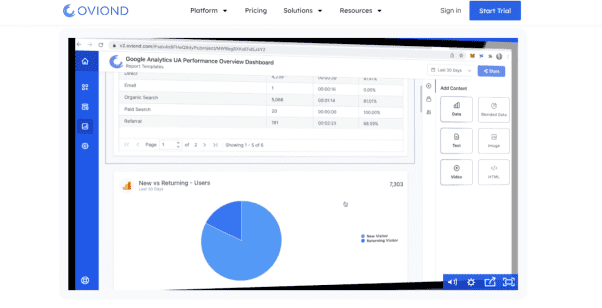
Oviond simplifies the reporting process by bringing together client data from multiple sources into a unified platform. This streamlines performance monitoring, reporting tasks, and enhances client communication with customizable white-label branding. The platform emphasizes seamless data connectivity, instant insights through customizable templates or reports, and the delivery of insightful reports that spotlight achievements and areas for enhancement, aided by automated email updates.
Oviond caters to digital marketing agencies, marketing teams, and small to medium-sized businesses (SMBs) aiming to improve their digital marketing reporting, enhance strategy monitoring, and attain success more efficiently.
| Pros | Cons |
| Compatible with various marketing tools for thorough data gathering | Customization for specific needs may pose a learning challenge to beginners |
| Provides personalized reports for client presentations | Advanced functionalities and extensive customization could incur higher costs |
| Streamlines report generation for efficient workflows | Some users might require more detailed data control based on their requirements |
| Simple interface facilitates easy report creation and distribution | – |

Agency Analytics is a thorough reporting platform designed specifically for marketing agencies. It simplifies the reporting process and enhances client presentations with customizable marketing dashboards. Its user-friendly interface and capability to showcase the complete impact of marketing endeavors across various campaigns and channels distinguish it.
This platform is ideal for small to mid-size agencies because of its scalability and wide range of features, which address their varied needs. It is especially advantageous for agencies prioritizing client transparency and streamlined reporting.
Key features:
- Powerful dashboard providing an integrated view of SEO metrics and campaign performances.
- Daily updates on local and global keyword rankings for accurate monitoring.
- Wide range of integrations enabling holistic SEO reporting by pulling data from multiple sources.
- Automated reporting allows for the scheduling of custom reports, improving operational efficiency.
| Pros | Cons |
| Integrates seamlessly with numerous services, providing a holistic perspective on marketing campaigns. | Some users encounter sporadic inconsistencies in the rankings. |
| Highly praised for its responsive customer support, promptly resolving issues. | Certain users feel that customization options for imported data are limited. |
| Offers competitive pricing, delivering added value compared to some rivals. | Some users perceive analysis tools, such as goal and conversion tracking, as rudimentary or ineffective. |
| Renowned for its user-friendly features and visually captivating data presentations. | – |
How To Choose The Best Tool For Your Agency?
White label SEO reporting provides agencies with a vital tool for showcasing their leadership in digital analytics. These customized technologies streamline complex SEO data into actionable insights tailored to meet client objectives. Automation enhances productivity and ensures branding consistency, thereby building trust with clients.
What distinguishes white label SEO reporting is its capacity to empower agencies as proactive strategic partners, propelling online growth. Embracing these platforms enables agencies to concentrate on offering high-value consultations, steering the advancement of their clients’ digital presence.
Choosing the right solution entails evaluating pricing, features, and customization options:
- Assess integrations to ensure comprehensive reporting.
- Consider template designs and automation for efficient client deliverables.
- Factor in monthly costs and potential premium fees for advanced functionality.
- Confirm branding flexibility for personalized reports.
By proactively embracing white label SEO reporting, agencies reinforce their expertise and nurture long-term client relationships while unlocking new business opportunities. These platforms consistently demonstrate mastery of analytics in every client interaction.
Conclusion
In essence, mastering White Label SEO Reporting goes beyond simple data presentation; it involves constructing a narrative that showcases expertise and provides value to clients. By employing the insights outlined in this guide, businesses can harness white label SEO reporting to strengthen their brand, cultivate client connections, and stimulate sustainable growth.
Embracing the intricacies of white label SEO reporting isn’t just a strategy but a commitment to delivering measurable results. With the right tools, tactics, and dedication, incorporating white label SEO reports into your business model can elevate your offerings and set you apart in a crowded market, guaranteeing enduring success and client contentment.
FAQs
What should be included in a White Label SEO Report?
A comprehensive White Label SEO report should encompass essential metrics like keyword rankings, organic traffic trends, backlink profiles, site audit results, competitor analysis, and any implemented actions or suggestions for enhancement. Customization options may vary depending on the provider.
How do White Label SEO Reports benefit agencies and resellers?
White Label SEO reports empower agencies and resellers to deliver professional-grade SEO analytics under their brand, thereby enhancing client satisfaction and loyalty. They also streamline operations by saving time and resources that would otherwise be invested in developing in-house reporting solutions.
How can White Label SEO Reports help clients understand their SEO performance?
White Label SEO reports offer clients clear, visually appealing insights into their website’s SEO performance. By presenting data in an understandable format and providing actionable recommendations, these reports enable clients to make informed decisions to enhance their search engine visibility.
Can White Label SEO Reports be integrated with other tools or platforms?
Many White Label SEO report providers offer integrations with popular marketing platforms such as Google Analytics, Google Search Console, and third-party SEO tools. This integration facilitates seamless data aggregation and comprehensive reporting across multiple channels.


